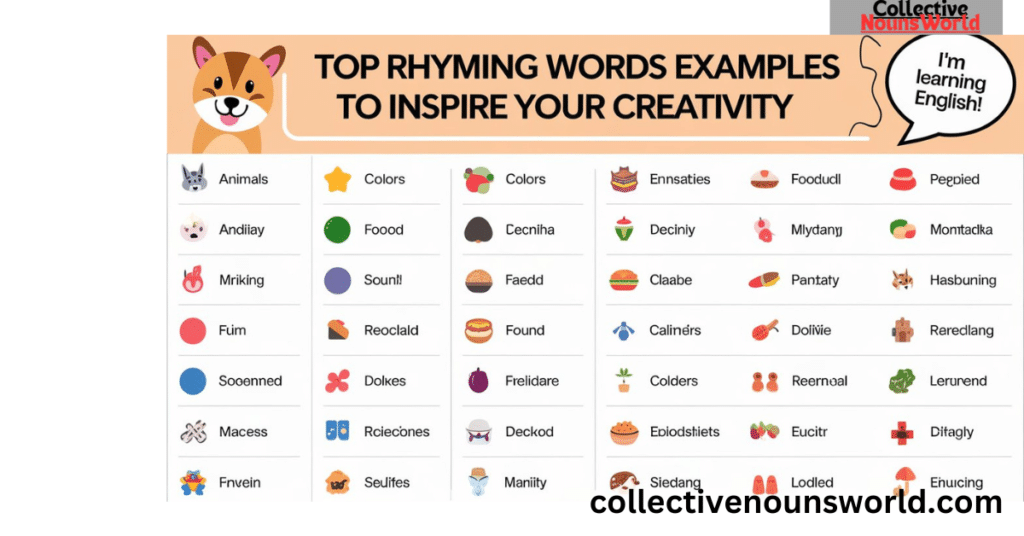Rhyming words have a magical quality that enhances language, infuses creativity, and makes communication engaging. Whether you’re crafting a poem, writing a song, or even creating fun nursery rhymes for children, understanding the importance of rhyming words can elevate your writing. In this article, we’ll explore a plethora of rhyming words examples, discover their role in poetry, and provide practical tips for incorporating them into your creative endeavors.
The Magic of Rhyming Words
Rhyming words are not just playful sounds; they have profound psychological and emotional effects on language. When you hear or read rhymes, your brain connects similar sounds, creating a sense of harmony and rhythm. This rhythmic quality enhances memory retention, making it easier for people to remember songs, poems, or catchy phrases.
Importance of Rhyming Words
- Enhances Memory: Rhymes aid in memory retention, especially in educational settings. Children learn better when they can associate words with sounds. Nursery rhymes are classic examples of this technique.
- Engages the Audience: Rhymes draw listeners and readers in, making communication more captivating. They evoke emotions, whether joy, nostalgia, or laughter.
- Improves Language Skills: Using rhymes can bolster vocabulary development. By exploring similar ending sounds, writers expand their language arts skills and enhance their creative writing abilities.
- Creates Rhythm and Flow: Rhymes give writing a melodic effect, contributing to a natural rhythm. This flow makes text more enjoyable to read aloud and listen to.
Learn more about What Is a Simple Predicate? A Clear and Easy Explanation
200 Sentences Featuring Rhyming Words
To inspire your creativity, let’s delve into a collection of 200 sentences featuring rhyming words. These sentences can serve as examples or prompts for your writing. They encompass various themes, allowing you to see how rhymes can fit into different contexts.
Example Sentences
Nature:
- The tree swayed gently in the breeze, bringing joy and peace with ease.
- The sun sets low, casting a beautiful glow.
Friendship:
- Together we laugh, together we play; friends forever, come what may.
- In the night sky, we look up high and dream without a sigh.
Animals:
- The cat sat on a mat, feeling nice and fat.
- The dog danced with glee, running fast and free.
Seasons:
- The leaves fall as the weather gets cool; autumn is beautiful, and nature is a jewel.
- Winter brings snow, covering the ground like a soft blanket that all around found.
Downloadable Worksheet
For those who wish to practice their own rhyming sentences, we have created a downloadable worksheet. This worksheet contains prompts and examples to help you get started.
50 Rhyming Words Sound Examples
Here’s a list of 50 common and interesting rhyming words. These words are grouped by themes or sounds, making it easier to find what you need when writing.
| Theme | Rhyming Words |
| Nature | Sky – Fly, Tree – Bee, Leaf – Reef |
| Friendship | Friend – End, Care – Share, Play – Stay |
| Emotions | Sad – Glad, Hope – Scope, Fear – Cheer |
| Action | Run – Fun, Dance – Chance, Sing – Ring |
| Food | Cake – Bake, Sweet – Meet, Bread – Spread |
100 Unique Rhyming Sentences
Building on the previous section, here are 100 unique rhyming sentences. These short, simple sentences can spark your imagination and serve as inspiration for your creative projects.
- The dog loves to jog near the fog.
- Flowers bloom in the spring gloom.
- Clouds drift across the bright thrift.
- The star shines in the night lines.
- The fish swim in the dim.
Examples by Theme
Nature
- The wind blows while the river flows.
- The mountains rise, touching the skies.
Friendship
- Together we stand, hand in hand.
- Secrets we share show how much we care.
Fun
- The clown wore a frown, but made everyone laugh around.
- The child skipped with joy, playing with his favorite toy.
Learn more about 150+Different Shapes Names with pictures | Shape List and Types
Creative Short Rhyming Sentences
For those who prefer brevity, here’s a collection of 50 short rhyming sentences that are under 10 words. These concise phrases can be particularly useful for writing poems or songs.
- I see the sea.
- The dog is on the log.
- Stars twinkle with a wink.
- Time flies when you’re in the skies.
- Rain falls and nature calls.
Rhyming Poems to Learn With Joy
Let’s dive into two original short poems that highlight the beauty of rhyming words in poetry.
Poem 1: Nature’s Beauty
In the forest deep, where secrets keep,
The rivers flow, and the flowers grow.
Birds take flight, in the warm sunlight,
Nature’s symphony is a sight to see.
Poem 2: A Friend’s Bond
A friend like you is rare to find,
With laughter shared and hearts aligned.
Through thick and thin, we will stand,
Side by side, hand in hand.
Funny Rhyming Sentences
Humor adds a delightful twist to rhymes. Here’s a section featuring humorous rhyming sentences that will surely bring a smile to your face.
- The cat wore a hat and danced like a brat.
- A frog on a log loves to sing a smog.
- The mouse in the house danced with a spouse.
- My silly dog likes to play with a frog.
Learn more about What is the Collective Noun for Cards?
Complete the Poem with Rhyming Words – Worksheet
Engage your creativity with a fill-in-the-blank worksheet designed to complete simple rhyming poems. Here’s a sample prompt:
Fill in the blanks with rhyming words:
The dog sits on the ___ (log) with a joyful ___ (jog).
How to Write Rhyming Words Easily
Writing rhymes can be a delightful challenge. Here’s a step-by-step guide to help you create your own rhyming words.
Identify Your Base Word
Start with a word you want to rhyme. This could be a theme or a central idea for your poem or song.
Explore Similar Ending Sounds
Look for words that share similar ending sounds. This is where rhyming dictionaries can be incredibly helpful.
Utilize Rhyming Dictionaries
Online tools and rhyming dictionaries can provide an extensive list of words that rhyme with your chosen word. For example, if you want to rhyme with “cat,” you might find words like “hat,” “bat,” and “rat.”
Practice with Various Sound Patterns
Experiment with different sound patterns, including near rhymes. Near rhymes can add uniqueness to your writing without straying too far from your intended meaning.
Experiment with Different Writing Forms
Try writing in various formats—poems, lyrics, or even funny sentences. Each form can inspire new rhymes and ideas.
Play with Rhyme Schemes
Rhyme schemes dictate how rhymes are structured in your writing. Common patterns include AABB, ABAB, or ABCB. Understanding these can enhance your writing’s rhythmic quality.
The Necessity of Rhyming Words in English Sentences
Rhyming words are essential in multiple aspects of language. Their impact stretches beyond simple poetry and songs; they play a crucial role in enhancing language skills and communication.
Benefits in Education
- Language Arts: Teachers use rhymes to develop vocabulary and improve reading skills. Rhyming worksheets are common tools in the classroom.
- Writing Poems: Students are encouraged to write their own poetry to express feelings and thoughts creatively.
Enhancing Creativity
Rhymes open doors to creativity. By playing with sounds and words, writers can explore new ideas and themes. This can lead to innovative creative writing pieces that captivate audiences.
Engaging Communication
In everyday language, rhymes make communication more engaging. Advertisements, slogans, and speeches often utilize rhyming words to leave a lasting impact on the audience.
Conclusion
The beauty of rhyming words lies in their ability to inspire creativity and enhance communication. From poetry to everyday language, their rhythmic quality and melodic effect can captivate and engage audiences. As you explore the examples provided in this article, consider how you can incorporate rhymes into your own writing. Whether you’re crafting a heartfelt poem or a fun song, the possibilities are endless.
Take the time to experiment with rhymes, play with sounds, and let your creativity flow. With practice, you’ll find that rhyming words can not only enrich your writing but also bring joy to your readers. Happy writing!







